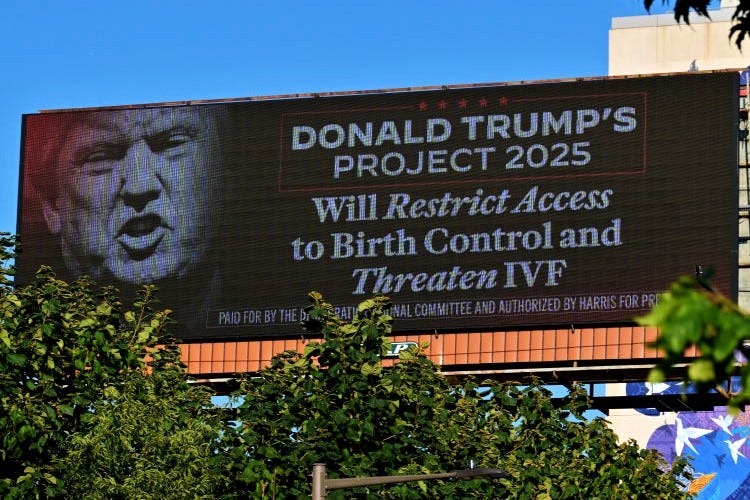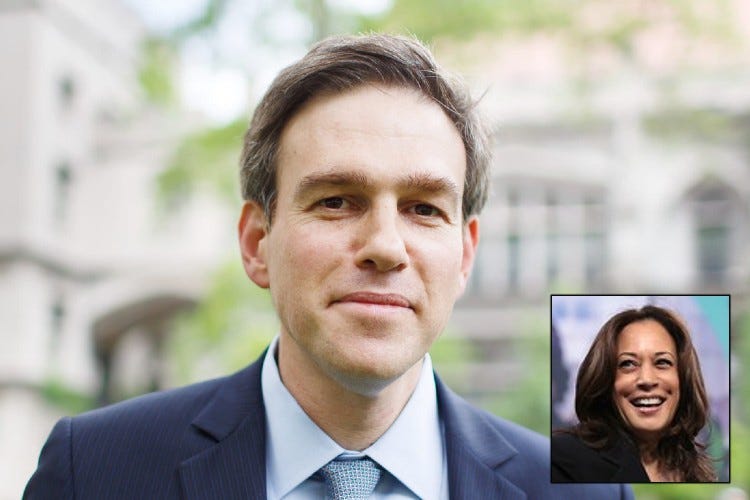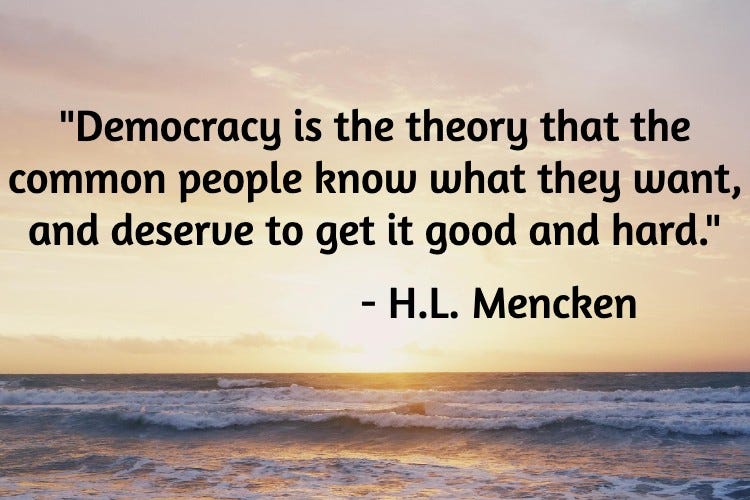
Project 2025 is shockingly unpopular. In a new NBC poll, Project 2025 got the most negative response of 13 items queried — it had a net negative of 53 points, making it more unpopular than Socialism and JD Vance combined (!!!). That’s why Trump has tried to supplant it with a vague non-platform with as much substance as a napkin with “#WINNING” scrawled on it. Trump has also bent over backwards to disown Project 2025, treating it with the cold disassociation that he usually reserves for his daughter Tiffany.
But: Of course Trump is disowning Project 2025 — it’s 53 points underwater! “Catching herpes from a water slide” probably polls better. Meanwhile, Kamala Harris is not exactly a shoe-in for the Pantheon of Policy Wonks; she’s spent much of this campaign running away from policies that she backed in 2019, and her plan to turn the FTC into the Grocery Police went over about as well as an all-white production of Roots. The message to candidates seems clear: Don’t talk about policy. It’s a trap. There’s more to be lost than gained from telling people what you plan to actually do with an amount of power that makes Ramesses the Great seem like a middle manager at a Sunglasses Hut.
I think this is a problem. As much as I made fun of Bret Stephens last week for stomping his feet about Harris’ lack of gravitas – and as much as I’d do it again in a heartbeat – I agree with him that candidates should have to present workable plans for major problems. But they objectively don’t have to do that – this year, one candidate will win despite publishing fewer white papers than Elizabeth Warren published in 2019 on the topic of Making Chipotle Give You, Like, A BIG Scoop Of Chicken alone. Is there anything we can do about that?
I’m tempted to answer that question with “Nope! See you tomorrow for a column about how we also can’t do anything about Lebanon.” Because there are several things that seem like possible answers that won’t work. One such thing is feckless whinging from pundits; Stephens’ threat to withhold his vote if Harris doesn’t up her game isn’t credible when the only alternative is a guy who makes this cow that got its head stuck in a tree seem like Isaac Newton. Demanding more specificity from Democrats works if and when Republicans run sensible, policy-oriented conservatives, but unfortunately, in today’s GOP, sensible, policy-oriented conservatives are outnumbered by guys who mix race hate with piss play on NudeAfrica.com.
Another thing that won’t work is to fool ourselves into believing that good policies and popular policies are always the same thing. They’re clearly not; the public appetite for Simple, Dumb Policy “Solutions” might be as great as their appetite for Simple, Dumb Superhero Movies. Harris proposed the grocery price-gouging thing because it polls well, and Trump’s “no tax on tips” brainstorm – which is barely different from randomly giving voters crisp $100 bills – is popular, too. This puts candidates in a bind where effective policies don’t earn any votes, and popular policies get them stuffed in a locker by policy bullies like Matt Yglesias and Josh Barro. So, candidates say as little as possible, and we’d probably do the same thing if we were in their shoes.
But I think there are two things we can do. The first is ranked-choice voting in primaries, and trust me: I wouldn’t write about voting systems – far and away the least popular thing you can write about on Substack – if I didn’t think it was important.
Though we don’t know a ton about Harris and Trump’s policy plans, we basically know where they stand. Harris wants more access to abortion, Trump wants less. Harris is pro-immigration, Trump would reinstate the Chinese Exclusion Act if he could. So, we don’t know specifics, but we do know which candidate will more-or-less push for things we like.
Primaries are different. Candidates are directionally similar, and decisions come down to things like character, electability, and who best threads the needle of being attractive-but-not-hot-in-an-intimidating-way. Here, policy can play a role: Two candidates might want the same thing, but one candidate might have a thoughtful plan to achieve that thing, while the other candidate has a plan to read The Secret and throw pennies in a fountain until affordable prescription drugs magically appear. In a primary, candidates can distinguish themselves with their policy chops; in the general election, a candidate can just say “you know what I’ll do” and they’re sort-of right.
But our primaries have come to be dominated by ideology and electability. Consider this crude-but-accurate description of the past few presidential primaries: Democrats were split between progressives and normies, and Republicans were split between MAGA and non-MAGA. If you didn’t vote for the candidate on your ideological track who was most likely to win, then you were helping the other faction. That created a dynamic that’s similar to a general election: If you know where you stand ideologically, then one candidate can quickly reach “only game in town” status. Ranked choice voting makes things more competitive within factions, which allows voters to be more picky about things like policy chops.
My second prescription is to stop rewarding candidates for proposing dumb bullshit that won’t work. That bullshit generally comes in two flavors. The first flavor is Trump-type nonsense whose stupidity should be called out loudly and often. In my opinion, the most ignored aspect of this campaign is that Trump has been wailing about inflation while proposing an unabashedly inflationary agenda. He should also be smoten by a lightning bolt if he ever utters the word “deficit”, because his economic plan — vague as it is — doesn’t come close to penciling out. Pundits have resigned ourselves to this not being a policy-oriented campaign, but we don’t have to let the candidates dictate the terms of debate; we can write about how Harris has a standard-issue Democratic platform and seems not-comfortable talking about policy, while Trump might know less than any human who ever lived and is to policy what Kenny G is to thrash metal.
The second type of campaign policy bullshit is pie-in-the-sky nonsense with no chance of becoming law. I’m sure that a few paragraphs back, when I said that primaries are our main chance to suss out policy, many Democrats had Vietnam-style flashbacks to the 2020 campaign. That’s because that campaign took place in Political Narnia, where Democrats have an 90-seat Senate majority and Americans are chomping at the bit to pay a 60 percent tax rate. One thing that drove the policy insanity that year was the idea that any concession to political reality constituted “negotiating against yourself,” so if you wanted a 50 billion dollar program, your opening gambit should be a 900 gajillion dollar proposal. We need to push back against that logic. Part of the challenge with policy design is to create something popular that might actually happen, so you shouldn’t get wonk points just for proposing a big, headline-grabbing bill that will be fast-tracked to the Congressional paper shredder.
Of course, the best way to foment a vigorous policy debate is to have both candidates be serious people who understand policy. Believe it or not, this is possible — archeologists have uncovered evidence that it occurred three million years ago in 2012. It just won’t happen this year. The risk/reward ratio for talking about policy is bad, and in the absence of a policy-adept candidate who is also a gifted communicator — who can make their opponent look like a dunce — that won’t change. These are the candidates we have. And this also is the quality of policy discussion that we’ll have until we have different incentives.







Voters demand politicians tell them what they want to hear, and then pretend to be mad that politicians lie.
I've recently been batting around the question of whether I really WANT presidential candidates doing deep dives on policy. Ideally, I want that from my Congressional and Senatorial candidates. I'm becoming more interested in how a presidential candidate thinks directionally and what they're likely to do in the foreign policy realm. This is a (severely) outdated example, but FDR didn't campaign in 1932 on a laundry list of legislation proposals. He spoke in larger, directional terms, which, given how rarely a final bill actually resembles the proposed plan, seems like the better way to operate. That doesn't strike me as necessarily a bad thing.